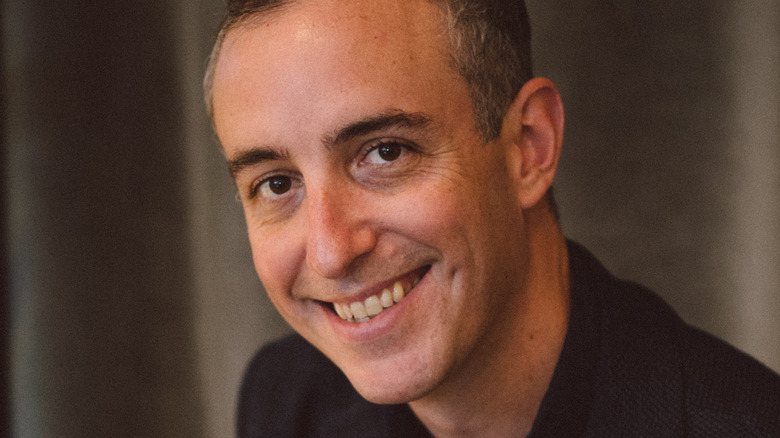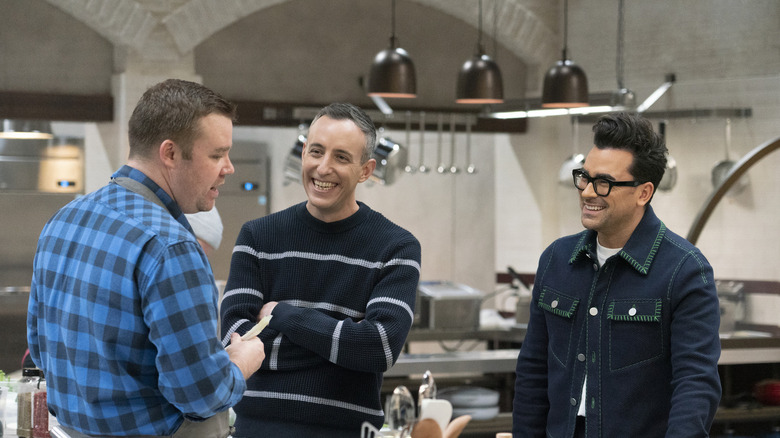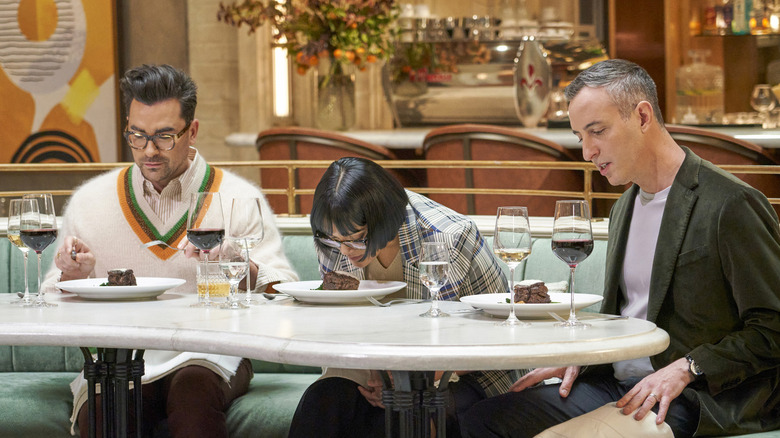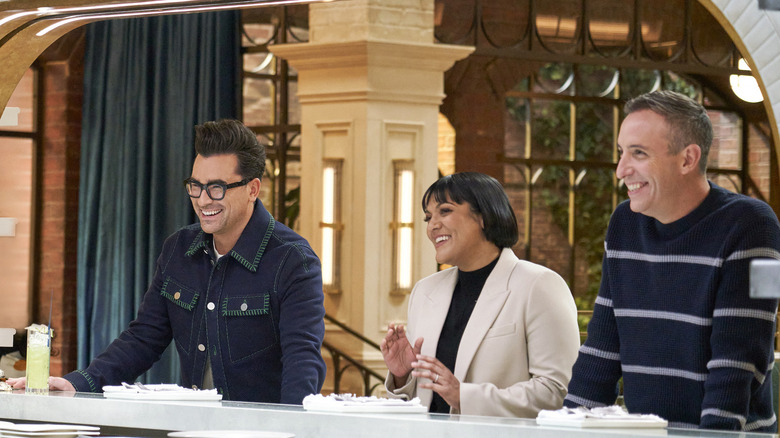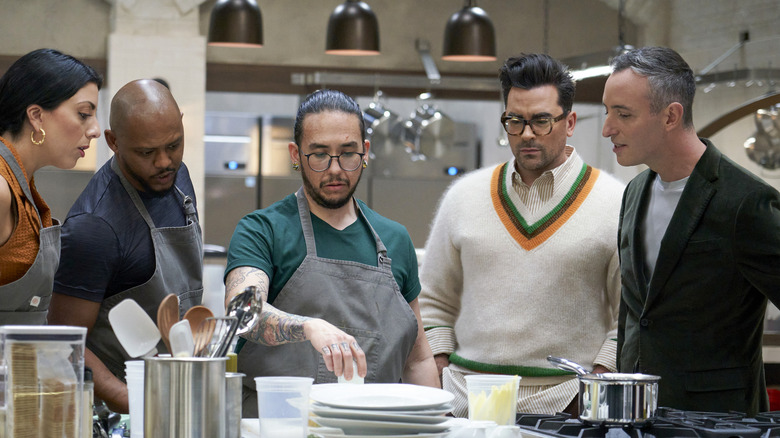Will Guidara Tells Us Why The Big Brunch Is Unlike Any Other Cooking Competition - Exclusive Interview
Watch just one episode of HBO Max's new cooking competition series, "The Big Brunch," and you'll quickly notice that the vibe is very different from what you might see on other cooking competition shows. There are no chefs attempting to sabotage one another in an effort to advance their own chances of winning the cash prize of $300,000. There are no judges berating contestants. Instead, contestants arrive with big business dreams and amazing brunch skills, and everyone works together even while competing in a breath of refreshing air that's difficult to find on most similar series (the closest you'll likely get is by going across the pond for "The Great British Bake Off").
This unique vibe isn't by happy accident, though. Creator Dan Levy (yes, of "Schitt's Creek" fame), along with co-judges restaurateur Will Guidara and Chef Sohla El-Waylly, entirely intended to create just this feeling with the eight-episode series that premiered in November and just wrapped up with its finale. To find out more, Mashed spoke with Guidara — whose work has included launching the Make It Nice hospitality group, which owns famous restaurants such as Eleven Madison Park and NoMad New York — about how he got involved with the show, why he thinks it sticks out in its genre, and his (possibly controversial) takes on brunch.
Getting it right
Can you tell me a little bit about how you got involved with the show?
I've known [executive producers] Andrew Fried and Sarina Roma for a while. Boardwalk Pictures did "7 Days Out," which was a show for Netflix, and one of the episodes was about Eleven Madison Park. Andrew Fried also did a "Chef's Table" episode with my wife, Christina Tosi. I've gotten to know them, and we've stayed in touch. We've always wanted to find another way to work together. When they started working on this, they reached out, and that led to a Zoom with us and Dan. The chemistry was right and I believed in the idea, and suddenly I found myself in Los Angeles making a TV show.
What was the filming process like? What were some of the best parts and some of the most challenging parts?
[It was] mostly best parts. I'd say [there were] a few things.
One, the chefs were awesome. ... There were these moments that I was so touched by, where, in spite of the fact that they were competing with one another, [the chefs] were helping one another. It's the case with anything in life. You try to — and I didn't pick the chefs; that was Dan and the team — pick good people to bring into your life. You don't always get it right, but they got it right, 100%, which was really, really cool. It made the whole thing much more delightful and restorative.
Two, I loved the chemistry between me, Dan, and Sohla. There's the old adage "If you love your work, you'll never work a day in your life," and it did not feel like work.
And three, as a restaurant guy, it was really fun to see how similar a restaurant team and a television team felt. [There were] so many different people working so hard. In all the articles and Instagram posts, people are talking about the chefs, and me and Dan and Sohla, and then sometimes Andrew and Sarina. There's an army of people that were so kind and so hardworking and so smart and talented and generous that made that show happen. To be a part of a team in a completely different industry that felt so close to home in terms of what I understand about teamwork and everyone pulling their weight — it was really special. The whole crew was unbelievable.
Talking about how the chefs were helping one another, one of the big things that I took away from the show was that it wasn't like a lot of cooking competitions that are somewhat aggressive. It was very wholesome. It was really refreshing.
I've seen some of these shows where it feels like the judges are just trying to tear people down. Criticism can either be a beautifully investing thing, or it can be a damaging thing. I believe in criticism in the workplace because that is someone taking the time to invest in someone else's growth. There are restaurants where they're aggressive and chaotic and damaging and not good, and there are restaurants where the culture is strong. This felt like that version of a restaurant.
'As perfectly human as possible'
What was the best thing that you ate during the show?
That's a hard one. I'll give you three. J's "wou-tine" was so good. Daniel [made] ... It was called the "oko-rito." It was his burrito with the Japanese pancake. I still think about that. Then, pick any one of Danielle's scones or biscuits.
Was there anything that a chef started making, and you were like, "That's not going to work. That can't work," but then you were really surprised because they pulled it off really well?
Absolutely. I'd be hard-pressed to name a dish right now, but there were certainly moments where I was 100% confident that it wasn't going to be good and then I was really pleasantly surprised.
There were definitely dishes that were being made that I had never had before. I didn't understand them. I needed to learn about them in order to play my role appropriately. That was a really cool thing about the experience, too. You get to a certain age, and it's not worth doing something unless you're going to have fun, you're going to work with great people, and you're going to learn a little something along the way, and this was the hat trick as far as those three things were concerned.
How did it feel having to send someone home with every episode? All of these people have such great dreams and are all deserving in their own ways.
That's the worst part of it, but it's like anything. In the beginning, [it's] internalizing that that's a part of it. You should allow yourself to be super-emotional through the journey, in terms of how you celebrate and support and invest and praise, and then not allow yourself to be too emotional with that part, because you need to make the right decision based on someone's performance.
How did you feel about the finale? Were there certain factors that you feel clearly made Daniel the winner?
It was a tough decision. It was a really tough decision. All three of the [chefs in the finale] were so talented. All 10 of them were really talented. When you get to the last three, it becomes really, really difficult. You try to break it down into as many little details as possible and then measure each one, one at a time, and then see who nets out ahead at the end.
For someone who hasn't seen the show, how would you describe it to them? How would you tell them what makes the show special and unique out of all the other cooking competitions that they could potentially watch?
I think the goal of it was to be as perfectly human as possible. One of the things [I said] in one of the earlier episodes was, "I hope there's no villain," and there wasn't, so I'd probably start with that. This is a reality competition show without a villain. There's drama in it, but it doesn't come from being dramatic. The drama comes from investing in people and being on a growth journey together, all of us. It's warm, and it's funny, and it's delicious, and it's beautiful.
The ultimate brunch spread
Before this show, what was your opinion on brunch?
I've always loved brunch. I know there's this whole narrative that everyone hates brunch. I think in certain restaurants, people don't enjoy working brunch service because, in those restaurants, brunch is such a departure from what the restaurant normally serves. It's almost like they have to serve brunch in order to get to do the other meal periods.
But ... the food, the service, the design — they're merely ingredients in the recipe of human connection. Brunch has always been one of the most connective meal periods, where people genuinely gel around the table over that meal. I also think it's the most democratic meal period, which, in a way, was symbolic of the way in which we tried to approach the show.
If you are going to make brunch at home, what's your perfect brunch spread? What are you cooking?
We don't cook brunch like we cook other meals in our home. For me, brunch is the thing that you go out and meet friends to do. Occasionally, when we have people over for a weekend, we all make brunch and it might be frittatas or waffles or eggs benedict if we're feeling ambitious. Although, I live up in the country a lot of the time these days, and when people come up to visit and we're going to do some sort of big late breakfast [or] brunch spread, someone will grab a whole spread from Russ & Daughters, and that's the best gift they could ever bring me.
For someone who wants to make a great brunch at home, do you have any top tips or things they should consider?
When we do cook brunch, the things that are important to me are that there's something sweet, there's something savory, and there are plenty of different glasses with plenty of different liquids in them. If you're entertaining for a brunch, it's about putting out a spread. You need either your waffles or your pancakes. You need something with eggs. It could be eggs cooked any which way — frittatas, omelets. You need bloody-somethings. You need bloodies with gin or vodka or however you drink your bloody.
I actually generally believe when I'm cooking dinner that less is more. I like to do pretty focused meals. I'm not the kind of person at home that has a bunch of different stuff on the table. We like to do a couple things and do them really well. At brunch, though, I think more is more.
Is there any brunch item that's just not for you?
A lot of people eat oysters at brunch. That's not my thing. That's not my thing at all. Dan and I both struggled a little bit with the oyster dishes that were served during that show.
Putting good energy into the world
Was there anything else you wanted to mention?
Everyone I've talked to says they love the show. I don't know how to measure whether a show's doing well or not. I have no idea whether there's going to be another season. But if there's one moment of impact that comes from the show, I [hope] that more people putting together ideas for television can be inspired [to see] that you can put good energy into the world and that's enough for people to love a show. You don't need negative clickbait to get people to engage. The more content out there that embodies the spirit of what we tried to embody, [which] I hope we achieved, the better off we'll all be.
All episodes of "The Big Brunch" are currently available for streaming on HBO Max.
This interview has been edited for clarity.
